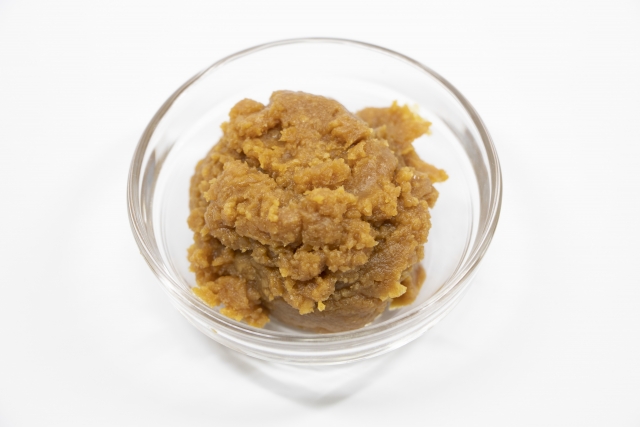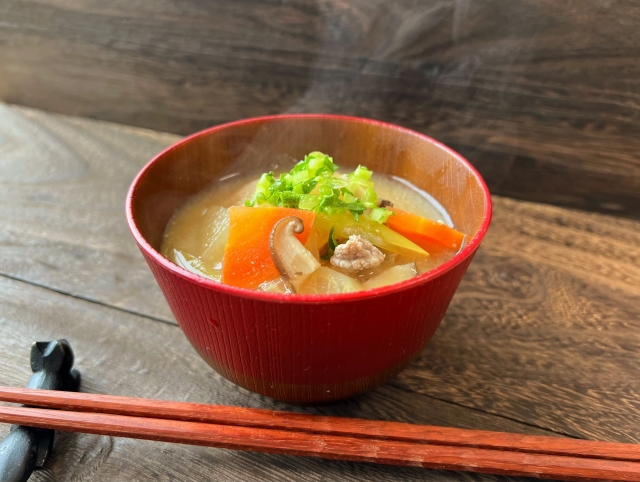What is Miso?

miso is a key ingredient in Japanese cooking and forms the base of the staple dish, miso soup. There are more than 1,000 types of miso, ranging in texture, flavor, and color. The paste, similar in texture to peanut butter, is typically a cultured mixture of soybeans, a grain (like rice or barley), salt, and koji (a mold). It is ready-to-use right out of the container and adds a salty, tangy and savory flavor to dishes. Lighter varieties tend to have more sweetness. Miso can be used for sauces, dressings, batters, and soups.
History of Miso Soup

Japanese people have long eaten miso soup. It is said that when Japan was still poor, people were able to maintain good health despite their simple diet thanks to rice and miso soup. Miso soup is an excellent healthy food because miso itself is nutritious, and because it is eaten with the broth in which the ingredients are boiled, the nutrients of the ingredients are also consumed together.
Miso soup was originally valued as food on the battlefield. In times of war, people used taro stems boiled in miso and dried as a cordage on the battlefield. The taro stems have many fibers that make them strong and easy to bind. The reason why taro stems are stewed in miso is not to make the strings stronger, but to chop them up and eat them in hot water when the food they brought as luggage ran out. In other words, it was the “original instant miso soup” that could be easily prepared on the battlefield without any cooking utensils.
Miso soup is sometimes called “omiozuke,” but it is strictly speaking a different thing. Omi otsuke” is written in Chinese characters as “omi otsuke goshu shoku,” which means “there are fruits on top of the soup and you eat them. In other words, it indicates that the soup contains so many ingredients that they overflow onto the top of the soup. Miso soup, on the other hand, seems to refer to a simple dish that does not contain as many ingredients as omi otsuke.
Why healthy?
Miso is a fermented food that may have a range of health benefits, including support for gut health, vitamin levels, cancer prevention, immune function and brain health. While there are promising studies in many of these areas, more research is needed to gain a firmer understanding of how the consumption of miso specifically may affect health in humans. Miso is a type of fermented food made from soybeans, salt, and koji (a type of fungus). It has been enjoyed in Japan for many centuries and has recently become popular in other parts of the world as an ingredient in popular dishes such as miso soup. Research suggests that incorporating miso into your regular diet may offer a range of health benefits. These include supporting gut health, promoting vitamin levels, reducing the risk of certain cancers, enhancing immune function, and supporting brain health. Eating miso may help to promote the balance of beneficial bacteria in the gut, as well as providing antioxidants and other nutrients, which can help to improve overall health. However, more research is needed to understand the specific impact of miso on human health. Therefore, for those who are interested in incorporating miso into their diet should be sure to consult with their healthcare provider prior to doing so.
Why healthy?
Miso soup is an incredibly healthy and nutritious food that can provide many health benefits. The main components of miso soup are miso, dashi (a type of fish stock), and tofu. Miso contains many essential vitamins and minerals that can provide numerous health benefits, such as improved immunity, better digestion, and increased energy. Dashi is rich in omega 3 fatty acids, which are known for their anti-inflammatory properties. Tofu is also a great source of protein and contains several important minerals, such as calcium, iron, and magnesium. One of the most important benefits of miso soup is its ability to boost the immune system. Miso is rich in antioxidants, which can help to fight off free radicals that can damage cells and lead to disease. The probiotics in miso have also been shown to improve digestive health, as well as reduce inflammation. The amino acid glutamine found in miso can also help to fight off harmful bacteria in the digestive tract. Another benefit of miso soup is that it can help to reduce stress. Studies show that the nutrients in miso can help to reduce cortisol levels, which is the hormone responsible for stress. Consuming miso also helps to boost serotonin levels, which is known as the “happy hormone” and can help to lift your mood. Additionally, the magnesium in miso has been linked to improved sleep. Miso soup is also very easy to make and can be enjoyed as a light meal or snack. All you need are a few ingredients and you can create a delicious and nutritious meal in no time. Miso soup can be enjoyed in many different ways, such as with noodles, vegetables, and even eggs. When making miso soup, it is important to use high-quality ingredients, as this will ensure that you get the full nutritional benefits. In conclusion, miso soup is a nutritious and delicious food that can offer many health benefits. It is rich in essential vitamins and minerals and can help to boost the immune system, improve digestion, reduce stress, and lift your mood. Miso soup is also incredibly easy to make and can be enjoyed as a light meal or snack. If you haven’t tried miso soup yet, now is the perfect time to give it a try and enjoy all of the amazing benefits it has to offer.
